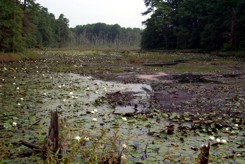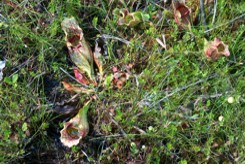Why Monitor Wetlands?
Prior to State and Federal regulation, approximately one-half of Maryland's wetlands were lost due to activities such as conversion to other land uses and drainage, as well as both natural and man-influenced erosion. In addition, many other wetlands are suspected of being degraded by changes to their natural water sources, pollutants and sediment from runoff, and encroachment by invasive species.

At the same time, the need for wetlands to continue providing such important services as flood control, water quality improvement, shore erosion protection, and wildlife habitat is increasing as Maryland's population grows.
In order to properly manage our remaining wetlands over time and benefit from their functions, we must better understand what their condition is and how and where they are providing valuable services.
Is Wetland Monitoring Required?
The Clean Water Act was authorized in 1972 to protect the chemical, physical, and biological integrity of the Nation’s waters. Among the provisions and programs required under the Act, Section 305(b) requires that the States conduct biannual monitoring to provide essential data for water quality protection. Maryland has extensive programs for conducting chemical and biological monitoring in surface and ground waters to meet these requirements. However, within Maryland’s monitoring programs, there is not a complementary effort underway for wetlands, despite their dual status as "waters of the United States" and "waters of the State."

In 2004, MDE received a grant from the U.S. Environmental Protection Agency to develop a strategy for monitoring Maryland's wetlands. Upon completion, scheduled for 2010, the strategy will present the framework, additional steps, and additional information and resources needed to address the following objectives:
1) Meet Clean Water Act reporting requirements;
2) Improve existing wetland and waterway regulatory programs;
3) Provide additional information for targeting wetland/waterway restoration and protection efforts;
4) Comply with Total Maximum Daily Load (TMDL) requirements, if applicable;
5) Develop use designations and water quality standards for wetlands;
6) Assist in evaluating the effectiveness of compensatory mitigation and voluntary restoration projects;
7) Improve our ability to comprehensively assess landscape and watershed function;
8) Develop the capability to study and assess the status of wetland condition over time; and
9) Make wetland condition and functional value information available for use in federal, State, local and citizen group-driven natural resource conservation and restoration efforts (examples include Tributary Strategies, TMDL implementation plans, Green Infrastructure Assessment, Strategic Forest Lands Assessment, etc.)
Status of the Monitoring Strategy
A group of State agencies, including the Maryland Departments of the Environment, Natural Resources, Agriculture, and the State Highway Administration has met several times to discuss respective monitoring needs. MDE will form a larger work group of stakeholders to continue strategy development later in 2008-2009.
For more information, please contact Ms. Denise Clearwater at (410) 537-3781 or email at [email protected].
Relevant Links
Wetland Assessment: Measuring the Quality of the Nation's Wetlands
Wetlands Monitoring and Assessment (EPA)
Methods for Evaluating Wetland Condition (EPA)
Mid-Atlantic Wetland Workgroup
Relevant Documents
Common Questions: Wetland Assessment (pdf)
Literature Review for Development of Maryland Wetland Monitoring Strategy: Background Information on Maryland's Wetland Types (pdf)
Maryland Wetland Monitoring Strategy (pdf)
Development of a Level 3 Wetland Assessment Template (pdf)
Literature Review for Development of Maryland Wetland Monitoring Strategy: Review of Evaluation Methods (pdf)
Literature Review for Delopement of Maryland Wetland Monitoring Strategy: Reviews of Evaluation Methodologies (pdf)